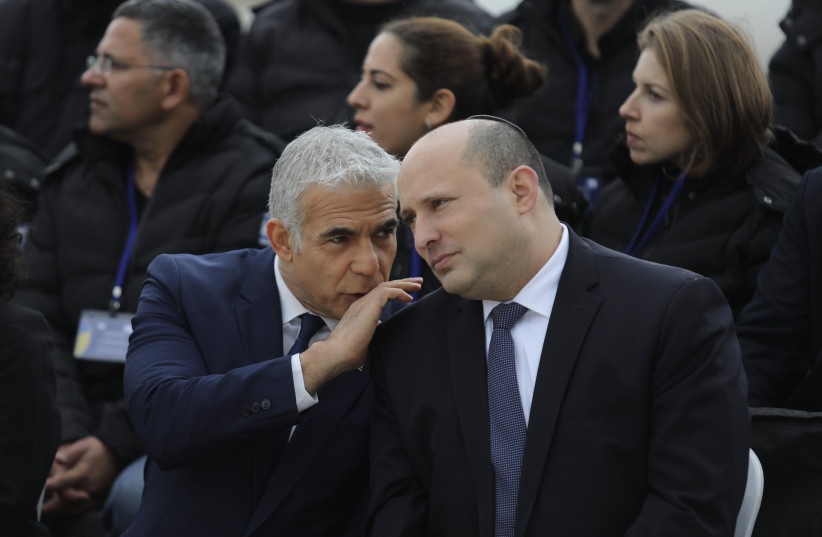Fifteen years ago, on the fourth day of Pesach, our second daughter was born at Hadassah Hospital in Jerusalem.
My mother came the next day to visit, and of course, being a Jewish grandmother, wanted to bring some home-cooked food for us to eat. But it wasn’t that simple. Guards at the entrance were checking bags and demanding that all food be left outside, to avoid hametz entering the compound. Did it make a difference that my mother’s food was hametz-free? Nope. The guards had no way of knowing, so all food was banned (I won’t reveal exactly how, but in the end, we managed to eat the food).
I was reminded of this story on Wednesday, when coalition whip Idit Silman stunned Prime Minister Naftali Bennett first thing in the morning and quit his coalition, taking with her the government’s one-vote Knesset majority.
On paper, Silman claimed that she could not support a government that was going to allow hametz into hospitals. She warned that the decision – handed down by the High Court – was going to undermine the State of Israel’s Jewish character.
While Silman could not have had it more wrong – it is, in fact, religious coercion that is undermining Israel’s Jewish character – that is beside the point. Her claim was simply false grandstanding. If she really cared about hametz in hospitals, then she would have met with the Health Ministry and found a compromise that allows people to retain civil liberties while not harming the feelings of observant Jews.

No, the reason she bolted the coalition was the same reason other members of her Yamina Party have done so, or are considering doing so: they find it hard to sit in a government in which they have had to forfeit their right-wing ideology.
Silman is not alone. It is also why MK Amichai Chikli left the coalition when it was formed, and why MK Nir Orbach and Interior Minister Ayelet Shaked have repeatedly considered bolting in the last few months: they have not liked this government since its inception.
Orbach lives in Petah Tikvah, Silman in Rehovot. Both have come under fire in their communities, at their synagogues, and within their families for sitting in a government with left-wing parties.
The writing for this defection was on the wall. And this is where Prime Minister Naftali Bennett made his strategic mistake: he missed the writing. He forgot that while you can gallivant around the world as Israel’s leader, mediate between warring countries and participate in historic peace summits in Arab capitals, in the end – when you only have 61 MKs in your coalition – all it takes is one backbencher to bring it all down.
It is also a lesson in the importance of how to create a party list. Yamina members were not elected in primaries like in the Likud or Labor. They were handpicked by Bennett. But there was nothing that connected them. Chikli jumped ship right when the government was formed, Abir Kara is under police investigation for double voting, Silman has defected, and Orbach has now issued his own ultimatum.
Bennett’s mistake was neglecting his party. The Knesset went on recess a few weeks ago? Instead of flying to Sharm e-Sheikh, he should have invited the MKs on a retreat to try to strengthen the alliance. It is not as glamorous as sitting in a presidential palace alongside two Arab leaders, but without political maintenance, none of it would be possible anyhow.
To Bennett’s credit, he jumped into his role as prime minister with the same vigor he tackled all previous ministries that he led. He passed a budget, strengthened ties with Arab countries, cracked down on Arab crime, rehabilitated US relations with the Biden administration, approved a procurement plan for the IDF, and helped push through a series of much-needed religion-state reforms.
But in Israel, Bennett learned, there is no such thing as just being prime minister of foreign affairs. You also have to manage the party and keep everyone in line. Yamina members, for example, criticized him on Wednesday for leaving them to fight in the Knesset and not looking back.
When he stood in Jerusalem two weeks ago next to US Secretary of State Antony Blinken and heard accusations about settler violence, Bennett failed to push back. Instead, what Yamina MKs heard was Bennett say “West Bank” for the first time in his political career.
He had broken too far left. Following the advice of adviser Shimrit Meir, Bennett pushed the envelopes’ boundaries and left his right-wing ideology behind. The problem was, the party members and their voters were still deep in the right. And though chief of staff Tal Gan-Zvi and Interior Minister Ayelet Shaked tried to keep Bennett in the right-wing camp, in the end he zagged left.
The result? Summits around the world, but a political disaster at home.
The polls tell it all. At one point Meir promised Bennett that with her strategy he would reach double digits. As of Thursday, Bennett – the incumbent prime minister – was polling at five seats, barely above the electoral threshold.
When will his tenure end? On one hand, the government can soldier on even without a majority. Yes, every Knesset vote will be a bloody debacle, but without a clear majority in the opposition, the coalition can survive.
At the same time, if Silman is just the beginning and more MKs will follow her out the door, then the government’s days are obviously numbered. One more defector means the opposition, in theory, could pass a bill to disperse the Knesset. This immediately sends Israel to an election, and would see Bennett removed from the Prime Minister’s Office and Yair Lapid move in (under their coalition agreement, if the government collapses prematurely, Lapid automatically becomes prime minister).
Would Netanyahu want to see Lapid as prime minister? Hardly. Neither would Defense Minister Benny Gantz. But what then are the options? Yes, the bad blood between those two has not faded since their split in 2020. But if Gantz is given the choice of either seeing Lapid become prime minister or agreeing to becoming prime minster himself in a coalition with Likud, he might well choose the latter – despite having been previously burned often by Netanyahu.
The next few weeks will be critical for the future of the coalition, determining if it can endure the long-term volatility of not having a clear majority. Either way, this week saw the beginning of the eventual collapse of the Bennett-Lapid government. The countdown to the next election has started.
***
“You don’t build a fire department when your house is on fire.” That is a line Eric Fingerhut has repeated a number of times over the past few weeks.
I met with the president and CEO of the Jewish Federations of North America in Jerusalem on Wednesday, curious to know how this pivotal Jewish umbrella group managed to mobilize so quickly to help the war effort in Ukraine. Part of the answer, I discovered, has to do with the DNA of the JFNA, but also with Fingerhut.

When Russia invaded Ukraine on a Thursday, the JFNA by Friday had launched an emergency fundraising campaign across its 146-member federations.
Its goal was $20 million. Within two weeks the federations reached it, and two weeks later surpassed $40 million.
The 90-year-old organization has vast experience in emergency campaigns. During the Second Lebanon War in 2006, federations raised over $300 million to help rebuild northern Israel. When the Soviet Union collapsed in the late 1980s, JFNA pledged $1 billion. And its efforts during the Six Day War are legendary. This is what federations do.
There is also Fingerhut himself. A former congressman, state senator, CEO of Hillel International, and head of Ohio’s system of public universities and colleges, he is a strong believer in the power of institutions and the change they can affect. The proof is in the results.
When he was appointed head of JFNA in September 2019, he had barely six months before the world locked down due to corona. It was then that the federations sprang into action, raising tens of millions to help keep open Jewish non-profits, despite the desperate economic downturn. In total, federations across North America raised in excess of $200 million to address the mounting needs of their communities.
“This is the power,” said Fingerhut, “of large distribution systems.”
Since the war broke out February 24, Fingerhut has visited Poland three times, and traveled to meet refugees in Warsaw as well as with frontline organizations along the Ukrainian border. Most of the money raised by the JFNA has gone to the JDC, the Jewish Agency, and a long list of other Jewish groups deployed in Ukraine and nearby.
The trips were important not only to understand the needs in the field, Fingerhut explained, but also to see firsthand who it is that needs the help; and seeing mostly women and children whose husbands and fathers had to stay in Ukraine to fight, and knowing that not all of them would return, was humbling.
Fingerhut said that in the long-term, the federations will need to focus on four sets of needs: humanitarian relief for Ukrainians; aliyah and absorption in Israel; Russian Jews, who are also in a tough position; and once the war is over, helping to rebuild Jewish life in Ukraine.
“There is no question that when times are good it is easier to ask why we need annual campaigns and infrastructure,” Fingerhut said. “In times of crisis it becomes more apparent.”
Looking at how the group responded to the Ukraine crisis, it is obvious. They deserve our gratitude.
